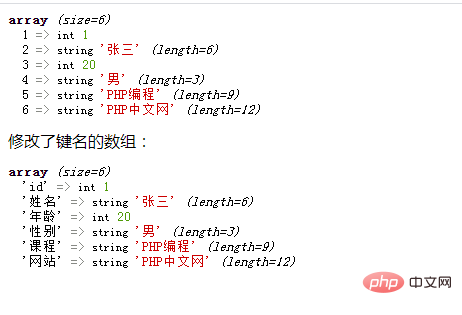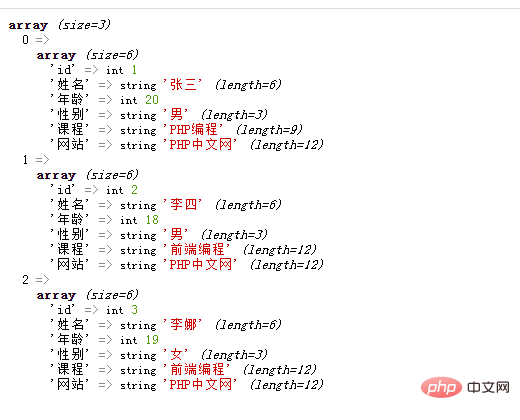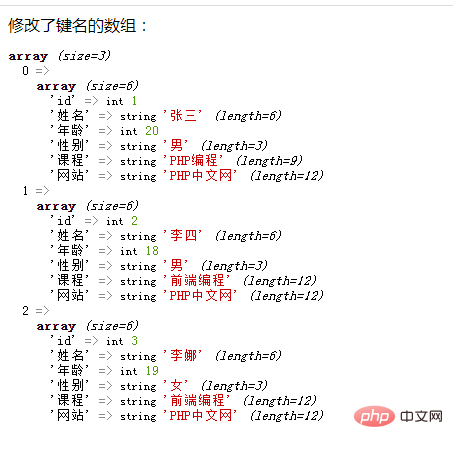
In the previous article, we introduced the method of resetting the index of a multi-dimensional array. If you are interested, you can click on the link to read → "PHP Array Learning: How to Reset the Index of a Multi-dimensional Array". This time we continue the study and practice of PHP arrays and talk about the method of modifying the array key name. If you need it, you can learn about it~
→Related recommendations: 《PHP Array Summary of learning series (continuously updated~) 》
The main content of today’s article is: changing the array key name, and talking about how to modify the key name key of one-dimensional array and two-dimensional array using PHP.
First let’s take a lookHow to modify the key name of a one-dimensional array?
If you want to modify the key name of the array, you can use the array_combine() function. The implementation code is given directly here:
<?php
header("content-type:text/html;charset=utf-8");
$arr=array(1 => 1, 2 => "张三", 3 => 20, 4 => "男", 5 => 'PHP编程', 6 => 'PHP中文网');
$key=array("id","姓名","年龄","性别","课程","网站");
$array=array_combine($key, $arr);
var_dump($arr);
echo "修改了键名的数组:";
var_dump($array);
?>Analysis code:
array_combine() function creates a new array by merging two arrays, one of which is the key name, and the other is the key name. The elements of the array are key values. Note: The number of elements in the two arrays must be consistent so that the key names and key values can correspond one-to-one. Otherwise, an error will be reported and FALSE will be returned. [Recommended article "PHP Array Learning: How to Create Arrays by Merging"]
We define an array of key names$key and use it as the array_combine() function The first parameter (the key name of the new array); and the original array $arr is used as the second parameter (the key value of the new array) of the array_combine() function.
The new array obtained in this way is an array using the new key name (the key value has not changed). Let’s take a look at the output result:

Okay, I understand. The method of modifying the key name of a one-dimensional array. Let's look at the two-dimensional array. You also need to use the array_combine() function. Two methods are introduced below:
Method 1: Use the foreach statement to traverse the array
<?php
header("content-type:text/html;charset=utf-8");
$arr=array(
array(1 => 1, 2 =>"张三", 3 => 20, 4 => "男", 5 => 'PHP编程', 6 => 'PHP中文网'),
array(1 => 2, 2 =>"李四", 3 => 18, 4 => "男", 5 => '前端编程', 6 => 'PHP中文网'),
array(1 => 3, 2 =>"李娜", 3 => 19, 4 => "女", 5 => '前端编程', 6 => 'PHP中文网')
);
$key=array("id","姓名","年龄","性别","课程","网站");
foreach($arr as $k=>$v){
$arr[$k] = array_combine($key, $v);
}
var_dump($arr);
?>Use the foreach statement to traverse the two-dimensional array $arr once, and add the inner layer number in each loop Assign the group value to $v; then use the array_combine($key, $v) statement to modify the key name of the inner array $v. Let’s take a look at the output:

Method 2: Use array_walk() array_slice() function to obtain the inner array
<?php
header("content-type:text/html;charset=utf-8");
$arr=array(
array(1 => 1, 2 =>"张三", 3 => 20, 4 => "男", 5 => 'PHP编程', 6 => 'PHP中文网'),
array(1 => 2, 2 =>"李四", 3 => 18, 4 => "男", 5 => '前端编程', 6 => 'PHP中文网'),
array(1 => 3, 2 =>"李娜", 3 => 19, 4 => "女", 5 => '前端编程', 6 => 'PHP中文网')
);
$key=array("id","姓名","年龄","性别","课程","网站");
function foo(&$v, $k, $key) {
$v = array_combine($key, array_slice($v, 0));
}
array_walk($arr, 'foo', $key);
echo "修改了键名的数组:";
var_dump($arr);
?>array_walk() function to array Each element in has a user-defined function applied to it. In the function, the key name and key value of the array are parameters.
Let’s take a look at the output:

Okay, that’s all. If you want to know anything else, you can click this. → →php video tutorial
Finally, I would like to recommend a free video tutorial on PHP arrays: PHP function array array function video explanation, come and learn!
The above is the detailed content of PHP array learning: changing the key of one-dimensional and two-dimensional arrays. For more information, please follow other related articles on the PHP Chinese website!




